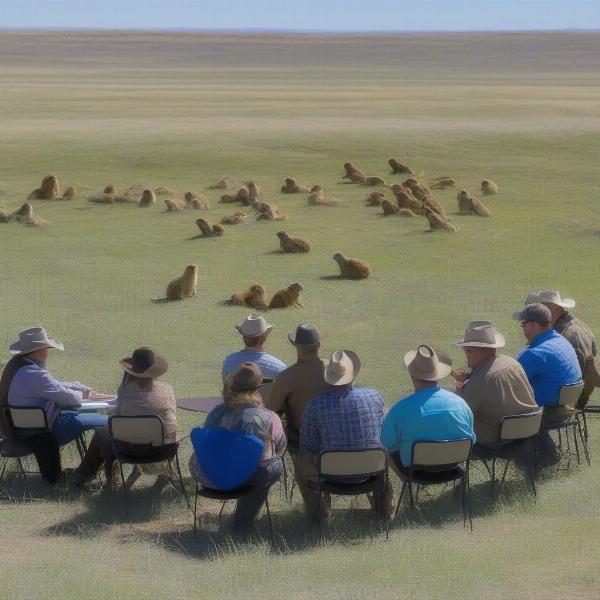Prairie dog hunting in South Dakota is a subject surrounded by various perspectives. While some view it as a necessary form of wildlife management, others express concerns about its ethical implications and impact on the ecosystem. This article explores the complexities of prairie dog hunting in South Dakota, examining the arguments for and against it, the regulations surrounding it, and the broader ecological context.
Prairie dogs are considered a keystone species in the grasslands of South Dakota, meaning their presence is crucial for the health and biodiversity of the ecosystem. They provide a food source for predators like ferrets, foxes, and eagles, and their burrows offer shelter for other animals. However, they can also be seen as pests by ranchers and farmers, as their burrowing activities can damage grazing land and interfere with agricultural practices. This conflict of interest lies at the heart of the debate surrounding prairie dog hunting.
Understanding the Regulations Surrounding Prairie Dog Hunting
South Dakota’s regulations concerning prairie dog hunting are relatively lenient. They are classified as non-game animals, meaning there are no closed seasons or bag limits. However, hunters must possess a valid South Dakota small game license. Landowners also have the right to control prairie dog populations on their property without a license. This regulatory framework aims to balance the interests of landowners with the need for wildlife conservation.
The Ecological Impact of Prairie Dog Hunting
The ecological impact of prairie dog hunting is a complex and debated topic. While some argue that controlled hunting can help maintain healthy prairie dog populations and prevent overgrazing, others express concern about the potential for overhunting and its impact on the predator species that rely on prairie dogs for food. Research on the long-term effects of prairie dog hunting is ongoing, and understanding the delicate balance within the grassland ecosystem is crucial for informed decision-making.
Ethical Considerations in Prairie Dog Hunting
The ethical dimensions of prairie dog hunting are also a significant part of the discussion. Some argue that the methods used in prairie dog hunting, such as shooting from vehicles, raise ethical concerns about fair chase and animal welfare. Others contend that as a keystone species, managing prairie dog populations is necessary for the overall health of the ecosystem, even if it involves lethal methods. The ethical considerations surrounding prairie dog hunting highlight the diverse values and perspectives within the debate.
Exploring Alternatives to Lethal Control
Exploring non-lethal methods for managing prairie dog populations is an important aspect of finding a balance between human interests and wildlife conservation. Relocation programs, habitat modification, and fertility control are among the alternatives being explored. These methods aim to reduce prairie dog populations without resorting to lethal control, offering a potentially more humane and sustainable approach to managing this keystone species.
The Future of Prairie Dog Management in South Dakota
The future of prairie dog management in South Dakota depends on ongoing research, open dialogue, and a willingness to consider diverse perspectives. Balancing the interests of landowners, the needs of wildlife, and the ethical considerations surrounding hunting practices is a complex challenge. Finding solutions that are both effective and sustainable is essential for the long-term health of the grassland ecosystem.
 The future of prairie dog management in South Dakota.
The future of prairie dog management in South Dakota.
FAQ
- Is a license required for prairie dog hunting in South Dakota? Yes, a valid South Dakota small game license is required.
- Are there any bag limits or closed seasons for prairie dog hunting? No, prairie dogs are considered non-game animals and are not subject to bag limits or closed seasons.
- Can landowners control prairie dogs on their property without a license? Yes, landowners have the right to manage prairie dog populations on their land.
- What are the ethical concerns related to prairie dog hunting? Ethical concerns include fair chase principles and the potential impact on the ecosystem.
- Are there non-lethal alternatives to prairie dog control? Yes, alternatives such as relocation and fertility control are being explored.
Conclusion
Prairie dog hunting in South Dakota is a multifaceted issue with ecological, ethical, and economic implications. Understanding the various perspectives and engaging in informed discussion is crucial for developing sustainable management strategies that balance the needs of humans and wildlife.
ILM Dog is a leading international pet website dedicated to providing expert advice on dog care and well-being. From breed selection and health care to training and nutrition, ILM Dog offers a wealth of resources for dog owners worldwide. We specialize in providing evidence-based information on all aspects of dog ownership, including responsible and ethical pet management. Contact us at [email protected] or +44 20-3965-8624 for expert guidance on your dog care journey.